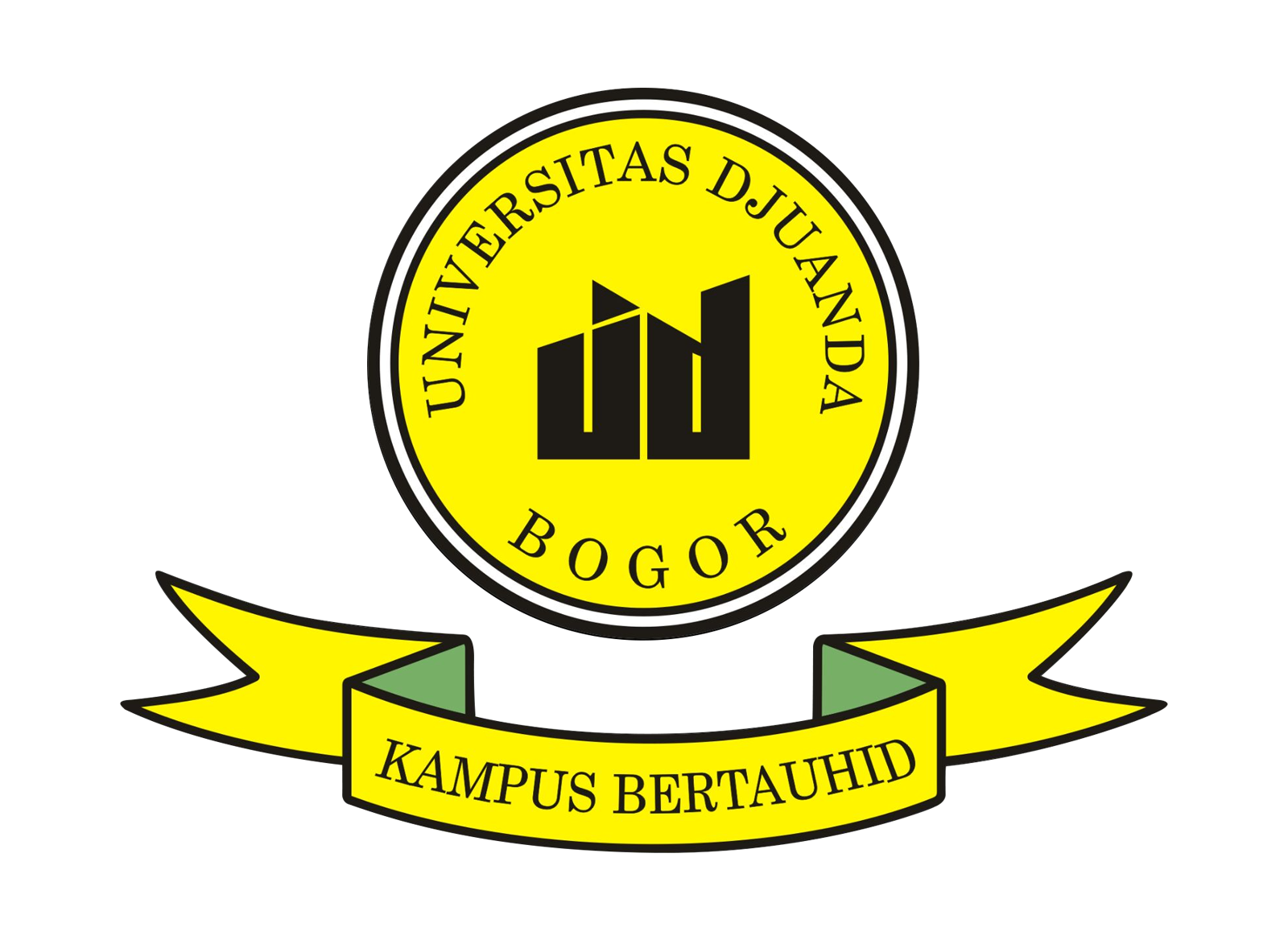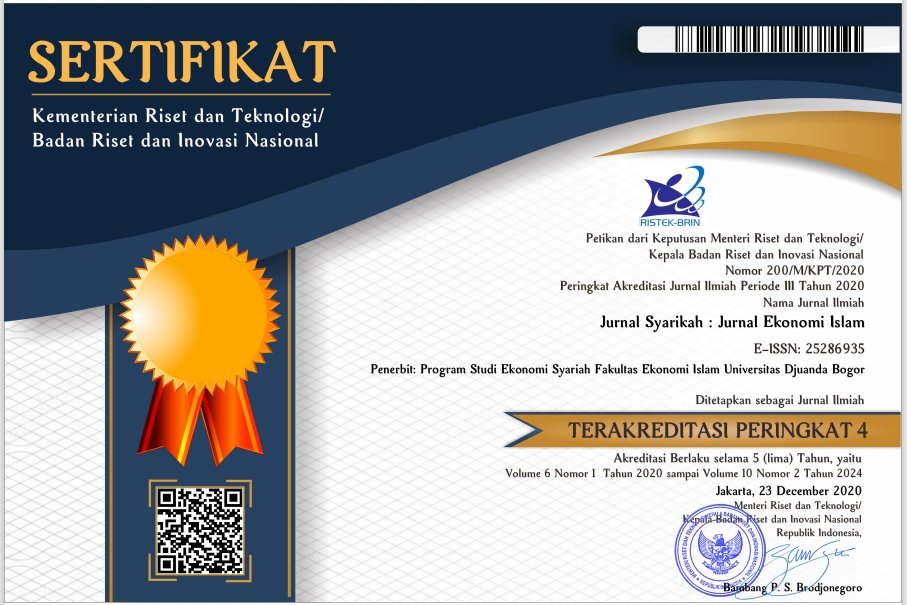FEASIBILITY ANALYSIS COMMODITY INFLATION IN BUSINESS UNIT PESANTREN INDONESIA
DOI:
https://doi.org/10.30997/jsei.v9i1.8012Keywords:
Feasibility Analysis, Inflation Commodities, Pesantren Business UnitAbstract
Hebitren is an initiative of business cooperation involving 110 pesantren throughout Indonesia which has the production of commodities. This study aims to analyze the inflationary commodities that can be produced by the pesantren business unit with a feasibility analysis approach in line with Bank Indonesia’s agenda. This study uses a case study method at Islamic boarding schools that are members of Hebitren. The data sources used are related documents, news, and journals. Triangulation is used with other documents, and interviews with Hebitren management. The result of this study indicate that business unit pesantren in Indonesia directly or indirectly can support keeping the inflation rate through supply-side inflation commodities, some Islamic boarding schools need to be developed in provinces that are producers of inflationary commodities, such as chili, which has the most significant production in East Java province, but Islamic boarding schools in that province have not been optimized to produce chili. Some pesantren can manage their production in general commodities and have even penetrated exports, some pesantren need to increase their production to maintain the inflation rate and the government should develop pesantren located in potential areas that produce inflationary commodities but there are no business pesantren that produce these inflation commodities.
References
Anggadwita, G., Dana, L. P., Ramadani, V., & Ramadan, R. Y. (2021). Empowering Islamic boarding schools by applying the humane entrepreneurship approach: the case of Indonesia. International Journal of Entrepreneurial Behaviour and Research, 27(6), 1580–1604. https://doi.org/10.1108/IJEBR-11-2020-0797
Arianpoor, A., & Sahoor, Z. (2022). The impact of business strategy and annual report readability on financial reporting quality. Journal of Asia Business Studies, October 2021. https://doi.org/10.1108/JABS-10-2021-0439
Ariatin, A., Dhewanto, W., & Sudrajad, O. Y. (2022). Business Model in Islamic Business Unit: A Lesson from Islamic Boarding Schools in West Java. International Journal of Applied Business Research, 2022(1), 32–49. https://doi.org/10.35313/ijabr.v4i1.193
Arvanitis, S., & Estevez, L. (2018). Feasibility analysis and study. The Emerald Handbook of Entrepreneurship in Tourism, Travel and Hospitality: Skills for Successful Ventures, 109–129. https://doi.org/10.1108/978-1-78743-529-220181019
Berry, G. R. (2017). Feasibility Analysis for the New Venture Nonprofit Enterprise. 20, 53–70.
Berry, G., & Shabana, K. M. (2020). Adding a strategic lens to feasibility analysis. New England Journal of Entrepreneurship, 23(2), 67–78. https://doi.org/10.1108/NEJE-08-2019-0036
Dua, P., & Goel, D. (2021). Inflation Persistence in India. Journal of Quantitative Economics, 19(3), 525–553. https://doi.org/10.1007/s40953-021-00237-z
Fauroni, R. L. (2016). Model Pemberdayaan Ekonomi Ala Pesantren Al-Ittifaq Rancabali Kab. Bandung. Inferensi, 5(1), 1. https://doi.org/10.18326/infsl3.v5i1.1-17
García Ortiz, P. A., Calderón García, H., Fayos Gardó, T., & Roa Vivas, N. (2021). Dynamic marketing capabilities as drivers of international channel integration: is this true for Latin American SMEs? Qualitative Market Research, 24(5), 653–682. https://doi.org/10.1108/QMR-01-2021-0007
Ghlichlee, B., & Goodarzi, A. (2022). Strategic human resource practices and new product development performance: the mediating role of intellectual capital. Journal of Intellectual Capital, 1997. https://doi.org/10.1108/JIC-11-2020-0360
Hendra, F., Supriyono, S., Efendi, R., Rosalinda, R., & Indriyati, R. (2021). a Business Feasibility Analysis of Small and Medium Enterprises for Product Strategy Determination. SCIENTIFIC JOURNAL OF REFLECTION : Economic, Accounting, Management and Business, 4(3), 421–431. https://doi.org/10.37481/sjr.v4i3.320
Im, K., Nam, K., & Cho, H. (n.d.). Towards successful business model management with analytic network process-based feasibility evaluation and portfolio management. https://doi.org/10.1007/s12525-020-00427-2/Published
Kambur, E., & Yildirim, T. (2022). From traditional to smart human resources management. 1817. https://doi.org/10.1108/IJM-10-2021-0622
Mawejje, J., & Lwanga, M. M. (2016). Inflation dynamics and agricultural supply shocks in Uganda. African Journal of Economic and Management Studies, 7(4), 547–567. https://doi.org/10.1108/AJEMS-07-2015-0079
Mthombeni, D. L., Antwi, M. A., & Oduniyi, O. S. (2022). Factors influencing access to agro-processing training for small-scale crop farmers in Gauteng province of South Africa. Agriculture and Food Security, 11(1), 1–7. https://doi.org/10.1186/s40066-022-00370-9
Nasrullah, M., Ismanto, K., & Nalim, N. (2018). Economic Independence of Pesantren: HUNAFA: Jurnal Studia Islamika, 15(2), 251–272. https://app.dimensions.ai/details/publication/pub.1111804186?search_mode=content&search_text= Pesantren ENTREPRENEURship&search_type=kws&search_field=full_search&or_facet_year=2021&or_facet_year=2020&or_facet_year=2019&or_facet_year=2018&or_facet_year=201
Purwono, R., Yasin, M. Z., & Mubin, M. K. (2020). Explaining regional inflation programmes in Indonesia: Does inflation rate converge? Economic Change and Restructuring, 53(4), 571–590. https://doi.org/10.1007/s10644-020-09264-x
Rofiaty, R. (2019). The relational model of entrepreneurship and knowledge management toward innovation, strategy implementation and improving Islamic boarding school performance. Journal of Modelling in Management, 14(3), 662–685. https://doi.org/10.1108/JM2-05-2018-0068
Siagian. (2015). Kemandirian Pesantren Melalui Pendidikan Life Skill (Studi di Pondok Pesantren Manahijussadat Cibadak lebak Banten). Pusat Penelitian Litbang Jakarta.
Tang, Y. K., & Konde, V. (2021). Which resource acquisition acts drive growth of informal firms? Evidence from Zambia. Journal of Small Business and Enterprise Development, 28(6), 888–907. https://doi.org/10.1108/JSBED-11-2020-0420
Tule, M. K., Salisu, A. A., & Chiemeke, C. C. (2019). Can agricultural commodity prices predict Nigeria’s inflation? Journal of Commodity Markets, 16(February), 100087. https://doi.org/10.1016/j.jcomm.2019.02.002
Yin, Robert. K. (2019). Studi Kasus Desain & Metode. Raja Grafindo. Jakarta
Zaki, I., Widiastuti, T., Yudha, A. T. R. C., Wijayanti, I., & Mi’raj, D. A. (2020). Implementation of Islamic entrepreneurial culture in Islamic boarding schools. International Journal of Innovation, Creativity and Change, 11(11), 452–469.
Zaki, I., Zusak, M. B. F., Mi’raj, D. A., & Hasib, F. F. (2022). Islamic community-based business cooperation and sustainable development goals: a case of pesantren community in Indonesia. International Journal of Ethics and Systems. https://doi.org/10.1108/IJOES-12-2021-0218
Downloads
Published
How to Cite
Issue
Section
License
Copyright (c) 2023 Jurnal Syarikah : Jurnal Ekonomi Islam

This work is licensed under a Creative Commons Attribution-ShareAlike 4.0 International License.
Authors who publish with Jurnal Syarikah: Jurnal Ekonomi Islam agree to the following terms:
- Authors retain copyright and grant the journal right of first publication with the work simultaneously licensed under a Creative Commons Attribution 4.0 International License that allows others to share the work with an acknowledgement of the work's authorship and initial publication in Jurnal Syarikah: Jurnal Ekonomi Islam.
- Authors are able to enter into separate, additional contractual arrangements for the non-exclusive distribution of the journal's published version of the work (e.g., post it to an institutional repository or publish it in a book), with an acknowledgement of its initial publication in Jurnal Syarikah: Jurnal Ekonomi Islam.
- Authors are permitted and encouraged to post their work online (e.g., in institutional repositories or on their website) prior to and during the submission process, as it can lead to productive exchanges, as well as earlier and greater citation of published work
SURAT PERNYATAAN PEMINDAHAN HAK CIPTA[1]
Yang bertanda tangan di bawah ini adalah penulis naskah yang berjudul:
yang diajukan untuk dipublikasikan pada Jurnal Syarikah : Jurnal Ekonomi Islam ISSN 2442-4420 menyatakan bahwa:
Kami bersedia memindahkan hak publikasi, distribusi, reproduksi, dan menjual naskah kamiyang berjudul tersebut di atas sebagai bagian dari Jurnal Syarikah kepada Dewan Redaksi Jurnal Syarikah : Jurnal Ekonomi Islam ISSN 2442-4420
Demikian surat pernyataan ini saya buat dengan sadar, penuh rasa tanggung jawab, dan tanpa paksaan dari pihak mana pun!
No | Nama Penulis (lengkap dengan gelar akademik) | Nama dan Alamat Institusi, email | Tanda Tangan | Tanggal |
1 |
|
|
|
|
2 |
|
|
|
|
3 |
|
|
|
|
4 |
|
|
|
|
5 |
|
|
|
|
[1] Dikirim ke Dewan Redaksi Jurnal Syarikah, Program Studi Ekonomi Islam Fakultas Ekonomi Islam Universitas Djuanda Bogor, Gedung B Lantai IV Jl Tol Ciawi No. 1 Kotak Pos 35 Ciawi Bogor 16720, difaksimilikan ke 02518240985, dan hasil scanning-nya diemailkan ke Jurnal.Syarikah@unida.ac.id


